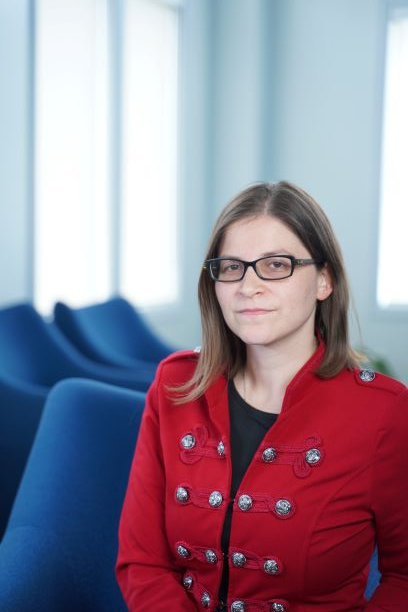
Jen Rinaldi, PhD
Associate Professor
Legal Studies
Faculty of Social Science and Humanities
Legal Studies
Faculty of Social Science and Humanities
Dr. Rinaldi's research focuses on urging enhanced support for Canadians with disabilities through storytelling and arts-based mediums
Full biography
Social and digital media have sharpened the lens through which abject bodies are portrayed, and too often critiqued. It has opened the world to intense criticism, and allowed virtual strangers to weigh in on everything from one’s sexual orientation and race to body image and body shaming, perpetrating hate and sometimes violence. Inspired by stories of strength and adversity, Jen Rinaldi, PhD, Assistant Professor in the Legal Studies Program of the Faculty of Social Science and Humanities, advocates increased awareness and vital support for persons with psychiatric and intellectual disabilities who not only face discrimination, but are victims of violence due to their circumstances. She works tirelessly to create arts-based opportunities for these individuals to become self-advocates and share their stories. Mental health diagnosis casts a wide net often stemming from internal emotional struggles or intellectual challenges. Dr. Rinaldi's critical body of research examines the development of narrative and arts-based methodologies to deconstruct eating disorder recovery, and to re-imagine recovery in relation to queer community. She also works in collaboration with Recounting Huronia, an arts-based collective that explores and stories traumatic histories of institutionalization. Co-ordinator of the Huronia Speakers Bureau, she helps former residents communicate the historical injustices that took place through its outreach program. Dr. Rinaldi's latest research explores artistic interpretation of works generated by individuals with disabilities, and aims to increase the disability presence in arts-based communities. She joined UOIT in 2012, and earned a tenure-track role within her faculty in 2014. She concentrates on disability law in her teaching. Diverse interests and influences led her to complete a Bachelor of Arts (Honours) in Philosophy and Classical Civilizations with Great Distinction from the University of Windsor in 2005, her Master of Arts in Philosophy with Honours from the University of Guelph in 2007, and her Doctorate in Critical Disability Studies at York University in 2013. Her graduate studies focused on the philosophy of law and identity politics of gender and disability studies.
Areas of expertise
Courses
- LGLS 2200ULegal TheoryThis course is a general introduction to legal theory. Some of the topics that may be covered include legal positivism, natural justice, critical legal theory, normative theory, sociological theories of law, feminist legal scholarship, legal pluralism and Marxian theories of law. The intention of this course is to give the student an appreciation for the range and power of theoretical perspectives in legal studies.
- LGLS 3220UPhilosophy of LawThis course explores the nature of law by examining fundamental legal concepts such as justice, authority, legal rules, and the obligation to obey. Students will learn to critically analyze patterns of legal reasoning and the goals they serve.
- LGLS 3300UDisability and the LawThis course examines disability from a human rights perspective. Students will be introduced to different theories and historical approaches to disability; domestic and national documents dealing with disability rights and mechanisms established to protect rights of disabled persons both nationally and internationally. The course will examine how law defines and treats disability in such contexts as employment, social assistance, medical treatment, criminal law, and education.
- LGLS 4030Law and the BodyThe course will consider a range of legal regimes that aim to protect, control, define or displace the human body, and the legal and ethical debates these regimes inspire or reflect. The theoretical underpinning of the course may include concepts of the ‘person’ in law, human dignity, theories of racialized and sexualized bodies, and disembodied notions of human subjectivity. Topics may include health law (legal and ethical issues in health care regulation, informed consent and right to access medical care; regulation of human reproduction and end of life care and decision-making); bioethics (ethics and governance in medical research on human subjects); legal regimes governing dead bodies and body parts (such as organ donation); the role of concepts of human development and abilities in the law (such as age of consent, mental disabilities); debates about physical punishments (the death penalty, imprisonment, chemical castration and their history); personal injury law (such as compensation for pain and suffering, mental distress, as well as quantifying physical injuries), and debates about non-corporeality of rights and harms (such as autonomy rights, personality rights, and the privacy rights of data subjects).
- Advanced Topics: Art and Law
Education
- 2013PhD - Critical Disability StudiesYork University, Toronto, Ontario
- 2007MA - PhilosophyUniversity of Guelph, Guelph, Ontario
- 2005BA - Philosophy and Classical CivilizationsUniversity of Windsor, Windsor, Ontario
Media appearances
- Community Living Ontario online December 31, 1969Survivors of institutionalization empowered to speak outUpdate Friday spoke with Dr. Jen Rinaldi, a researcher at the University of Ontario Institute of Technology (UOIT), who is the volunteer administrator for the Bureau, and Harold Dougall, a former resident and Bureau presenter. The Bureau itself is part of a larger initiative called Recounting Huronia: A Participatory Arts-Based Research Project, which was funded by a UOIT Social Science and Humanities Research Council Insight Development Grant. Dr. Rinaldi provided some insight on what the Bureau hopes to accomplish.
- Channel 12 CHEX TV Durham tv November 2, 2016Huronia Survivors Speak OutIt was once an institution for developmentally or intellectually disabled children. Thursday, survivors talked about the horrific conditions and treatment they experienced while living at the former Huronia Regional Centre in Orillia.


